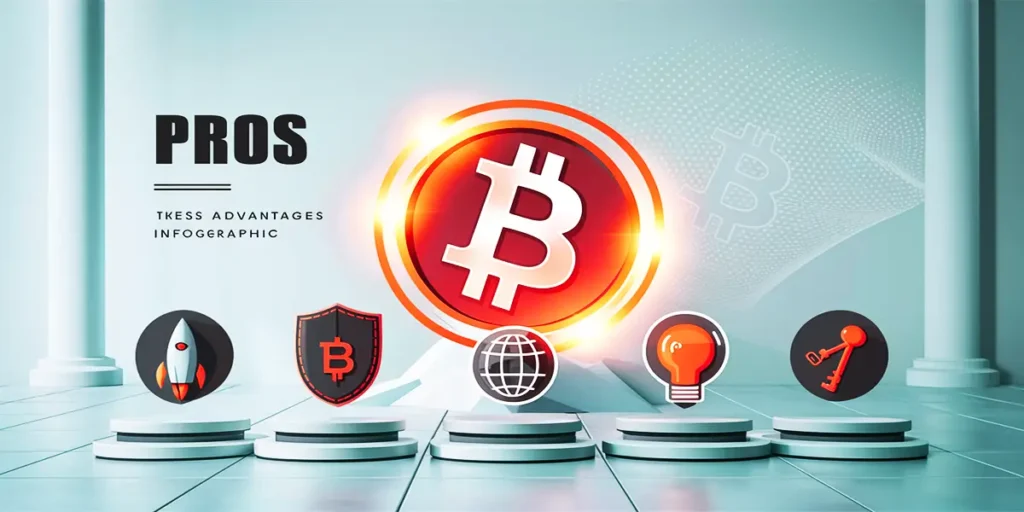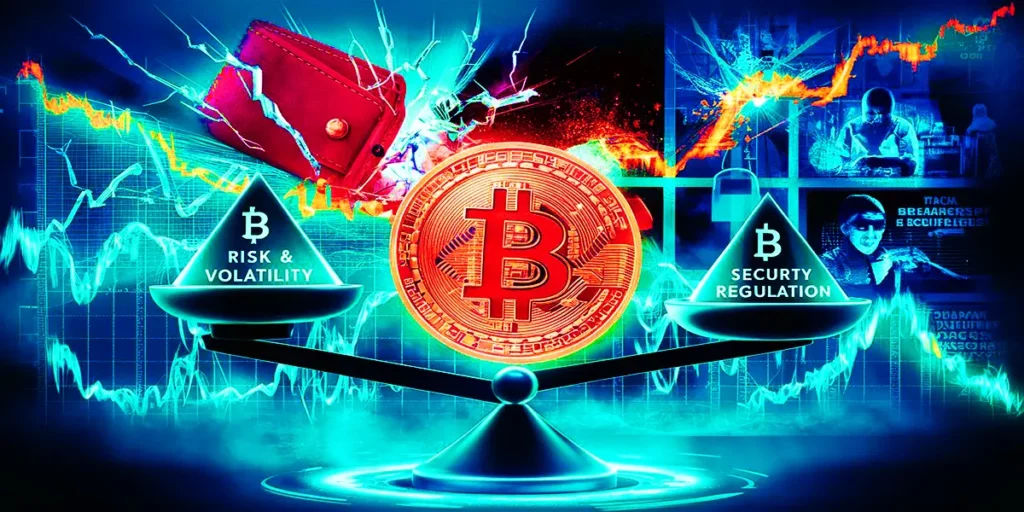Bitcoin has changed how people think about money. It’s not run by banks or governments, and anyone with an internet connection can use it. That freedom makes it both exciting and risky, a mix that attracts millions of people around the world.
In this article, BTCRepublic explains the real pros and cons of Bitcoin in simple terms. You’ll learn what makes it different from regular money, why its price moves so much, and what to think about before getting started. By the end, you’ll understand both sides, the benefits and the challenges, behind Bitcoin’s global rise.
Key Takeaways
| Insight | Summary |
| Bitcoin puts you in charge | You control your own funds without needing a bank, full ownership of your money. |
| Great for global use | Sending or receiving Bitcoin across borders is fast and often cheaper than traditional transfers. |
| Limited supply equals to long-term value | Only 21 million Bitcoins will ever exist, making it resistant to inflation. |
| Volatility is real | Prices can change fast, gains and losses happen quickly, so learn before investing. |
| Check local rules | Some countries restrict crypto use; always understand the laws where you live. |
| Security matters most | Store Bitcoin safely using trusted wallets and never share your private keys. |
| Start small and learn | Begin with small amounts, use BTCRepublic guides, and grow your confidence step by step. |
Facts & Original Research
Start small, learn wallets first, and write down your keys. Your money stays safe when your process stays simple.
- Key Takeaways
- Facts & Original Research
- What Is Bitcoin and Why It Matters
- Pros of Bitcoin (The Good Side)
- 1. Lower fees, especially across borders
- It’s limited and can’t be inflated
- Global access, all you need is the internet
- Cons of Bitcoin (What to Watch Out For)
- The price goes up and down a lot
- Some countries aren’t crypto-friendly
- Mistakes are permanent
- Mining can hurt the environment
- Pros and Cons of Bitcoin in Summary
- Should You Get Started? Here’s a Simple Plan
- Common Bitcoin Mistakes People Make
- Conclusion
- Frequently Asked Questions (FAQs)
Stable Facts You Can Cite
| Topic | Fact | Why it matters |
| Supply | Bitcoin has a hard cap of 21,000,000 coins. | Sets a ceiling. People use this as a hedge against money printing. |
| Issuance | Lower supply growth can affect the price over time. | You only need a wallet and the internet to use it. |
| Access | You only need a wallet and the internet to use it. | Works for global users, including the unbanked. |
| Control | With self-custody, you hold your keys and funds. | You don’t rely on a bank or card network. |
| Finality | Bitcoin transfers are irreversible. | A wrong address means a permanent loss. |
Write your seed phrase on paper. Store a copy in a second safe place. Never type it into a website.
What Is Bitcoin and Why It Matters
Bitcoin is digital money that runs on a public network called the blockchain. Instead of banks or governments controlling it, people around the world keep it running through computers that record every transaction. This makes it open, transparent, and hard to fake.
Many people pay attention to Bitcoin because it offers freedom, speed, and access. You can send or receive it anytime, anywhere, no middleman needed. It’s also limited in supply, which gives it long-term appeal. At BTCRepublic, our goal is to make crypto simple and clear so beginners can understand how this new form of money works.
Pros of Bitcoin (The Good Side)

1. Lower fees, especially across borders
Sending money with Bitcoin often costs less than traditional transfers. It’s faster too, especially for global users who move funds between countries. Whether it’s helping family abroad or paying freelancers worldwide, Bitcoin reduces the middleman costs that banks and payment apps usually charge.
It’s limited and can’t be inflated
There will only ever be 21 million Bitcoins. That fixed supply keeps it different from paper money, which governments can print anytime. Because of this limit, many see Bitcoin as a store of value that may protect savings over time.
Global access, all you need is the internet
Anyone, anywhere, can use Bitcoin with a simple phone or computer. It gives access to people who don’t have bank accounts, especially in digital-first or developing regions. Bitcoin turns the internet into a financial system where everyone can take part equally.
Cons of Bitcoin (What to Watch Out For)

The price goes up and down a lot
Bitcoin’s price can rise or fall within hours. That means you could gain fast, or lose just as quickly. Many beginners buy during hype cycles and panic when prices drop. Understanding market swings before investing helps avoid emotional decisions and big losses.
Some countries aren’t crypto-friendly
Not every government supports Bitcoin. Some have strict rules, taxes, or even bans on using it. Before buying or trading, always check your local laws to stay compliant. Rules can change quickly, so keeping up to date is part of staying safe in crypto.
Mistakes are permanent
Bitcoin transactions can’t be reversed. If you send coins to the wrong address or lose your private keys, there’s no way to recover them. It’s like sending cash in the mail; once it’s gone, it’s gone. Double-check every step when making payments or storing funds.
Mining can hurt the environment
Bitcoin mining uses electricity to secure the network, and that energy use can be heavy. While newer miners and renewable sources are improving efficiency, environmental concerns remain. The crypto community continues working on cleaner energy solutions to make mining more sustainable.
Pros and Cons of Bitcoin in Summary
Bitcoin offers financial autonomy using blockchain technology. Bitcoin’s superiority over the traditional financial system is evident due to its borderless nature, security features, scarcity, and ability to promote financial inclusion.
However, bad actors are exploiting this decentralised technology to conduct illegal activities. This issue creates friction with governments and regulators. Bitcoin’s continued growth also overwhelms the network as developers rush to address scalability issues.
Amidst these benefits and challenges, Bitcoin remains undefeated and continues to gain global adoption. As more users join the cryptocurrency industry, there is a need to make informed decisions, given the price volatility and regulatory concerns. Bitcoin users should also engage responsibly with Bitcoin and other cryptocurrencies.
Should You Get Started? Here’s a Simple Plan
Getting into Bitcoin doesn’t have to be complicated. Follow these simple steps to stay safe and learn at your own pace:
- Start small. Begin with an amount you can afford to lose; this helps you learn without stress.
- Learn how wallets work. Understand the difference between online, mobile, and hardware wallets.
- Store it safely. Keep your recovery phrase offline and private.
- Use trusted exchanges. Stick to platforms with strong security and clear withdrawal options.
Small steps build strong habits.
Common Bitcoin Mistakes People Make
- Thinking it’s anonymous: Bitcoin is public, not private — every transaction stays on the blockchain.
- Falling for fake giveaways: Scammers promise free coins to steal your funds.
- Storing coins on the wrong platform: Keeping Bitcoin on untrusted exchanges or apps risks losing access or getting hacked.
Conclusion
Bitcoin isn’t perfect, but it’s powerful. It gives people control, freedom, and access to money without borders. Yet, it also comes with risks like price swings and security mistakes.
Use what you’ve learned here to make smarter choices as you explore the crypto world. Keep reading BTCRepublic for more beginner-friendly guides that simplify Bitcoin and help you grow your understanding, one step at a time.
Frequently Asked Questions (FAQs)
Is Bitcoin safe to use?
Bitcoin is safe when handled correctly. The blockchain itself is secure, but your safety depends on how you store your coins. Always use trusted wallets, keep your recovery phrase offline, and avoid sharing private keys with anyone.
Why does Bitcoin’s price change so often?
Bitcoin’s price moves because demand and supply shift quickly. When more people buy than sell, the price rises, and the reverse causes drops. News, regulations, and investor behaviour also play a big role in these changes.
How much Bitcoin do I need to start?
You don’t need a full Bitcoin to begin. You can start with as little as $1 or a few satoshis (the smallest Bitcoin unit). The key is to start small, learn how it works, and grow from there.
Can I use Bitcoin to buy everyday items?
Yes. Many online stores and some local merchants accept Bitcoin for payments. You can buy goods, services, or even send money to family abroad; all you need is a compatible wallet and internet access.
Which Bitcoin wallet is safest for beginners in 2025?
For new users, start with a mobile wallet such as BlueWallet or Trust Wallet for simplicity. Once comfortable, upgrade to a hardware wallet for long-term protection and offline storage.
Is Bitcoin legal worldwide?
Bitcoin is legal in most countries, but not everywhere. Some regions regulate it like property or investment, while others restrict or ban it. Always check the latest rules where you live before buying or using Bitcoin.










